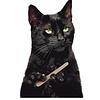You need to sign in or sign up before continuing.
Take a photo of a barcode or cover
reflective
medium-paced
A 90-page complaint that people don't fall in love like they used to in 19th century novels.
Han basically argues that dating apps and social media have turned romance into a shopping experience, essentially suggesting the solution is to basically become a monk who stares at paintings all day.
The whole "modern love is too optimized" premise probably felt fresh in 2012, but it's just sort of banal in 2025.
The key insight is that real love requires accepting otherness and risk, which is fine, but then he uses the rest of the book telling us we're all porn-addicted dopamine zombies who forgot how to feel.
Sure, perhaps tinder is turning us all into achievement-oriented romance robots, but at least give me some actionable tips beyond "contemplate art and read heidegger until you remember how to love properly"
It's an interesting critique of how capitalism commodifies everything, including our desires. Yet reading it feels like getting lectured by that one philosophy major who thinks having an instagram account means you're spiritually bankrupt.
tl;dr: Han acknowledges modern dating is broken, suggests we fix it by becoming 19th century romantic poets. Accurate diagnosis, questionable prescription.
challenging
emotional
informative
inspiring
mysterious
fast-paced
Harte Selbstsicht der Gesellschaft, viel zum Nachdenken, wenig endgültige Schlüsse.
Para aquellos familiarizados con el pensamiento de Byung-Chul Han, tenemos aquí otro de sus breves trabajos sobre una cuestión específica del mundo contemporáneo. En este caso un libro sobre la "decadencia" (o agonía) del amor en la sociedad actual.
Byung-Chul Han parte de sus ya tradicionales categorías de positividad (lo igual, lo mismo) y negatividad (el límite, la alteridad, lo otro) para analizar la cuestión del amor. En este sentido, Eros pertenece a la categoría de la negatividad, pues supondría el salir de sí mismo al encuentro de lo radicalmente otro. El autor concibe el Eros como lo opuesto al narcisismo productivo de la autoexplotación característico del sujeto neoliberal contemporáneo (una figura de la categoría de positividad).
Entablando un diálogo con la obra de autores como Eva Illouz, Michel Foucault o Giorgio Agamben (de los que se distancia considerablemente) y reivindicando ideas de Platón/Sócrates, el neoplatónico contemporáneo Alain Badiou (autor del prólogo del libro) y, sobre todo, su adorado Hegel (en donde llega a identificar al Eros con el Espíritu Absoluto), el autor construye un relato de Eros como negatividad radical frente a figuras (con las que es excesivamente crítico y de las cuales ignora su componente subversivo) como la de la sexualidad física o la pornografía, a las que relaciona abiertamente con los vicios de positividad de la sociedad de consumo masivo propias de la sociedad del capitalismo tardío.
Cabe destacar también los dos últimos capítulos del libro, dedicados a la relación entre Eros y política por un lado y la relación entre Eros y pensamiento por el otro, quizás los dos fragmentos más estimulantes para la reflexión de todos los que se recogen en el libro.
Si ya habéis leído otros trabajos del autor, sus conceptos y el modo breve y directo de tratar las cuestiones os resultarán ya de sobra conocidos. En este sentido muchos de los aspectos de este trabajo coinciden con otros temas abordados en otras de sus obras y se encaja fácilmente en el conjunto de su obra. Quizás no sea de mis libros favoritos de Byung-Chul Han puesto que no me convence su tratamiento del amor idealista pero resulta incuestionable que es coherente con su pensamiento general y puede tener interés para el que busque recuperar nociones neoplatónicas y neohegelianas del amor para el siglo XXI, pues al parecer es una figura agonizante pero no totalmente devastada.
Byung-Chul Han parte de sus ya tradicionales categorías de positividad (lo igual, lo mismo) y negatividad (el límite, la alteridad, lo otro) para analizar la cuestión del amor. En este sentido, Eros pertenece a la categoría de la negatividad, pues supondría el salir de sí mismo al encuentro de lo radicalmente otro. El autor concibe el Eros como lo opuesto al narcisismo productivo de la autoexplotación característico del sujeto neoliberal contemporáneo (una figura de la categoría de positividad).
Entablando un diálogo con la obra de autores como Eva Illouz, Michel Foucault o Giorgio Agamben (de los que se distancia considerablemente) y reivindicando ideas de Platón/Sócrates, el neoplatónico contemporáneo Alain Badiou (autor del prólogo del libro) y, sobre todo, su adorado Hegel (en donde llega a identificar al Eros con el Espíritu Absoluto), el autor construye un relato de Eros como negatividad radical frente a figuras (con las que es excesivamente crítico y de las cuales ignora su componente subversivo) como la de la sexualidad física o la pornografía, a las que relaciona abiertamente con los vicios de positividad de la sociedad de consumo masivo propias de la sociedad del capitalismo tardío.
Cabe destacar también los dos últimos capítulos del libro, dedicados a la relación entre Eros y política por un lado y la relación entre Eros y pensamiento por el otro, quizás los dos fragmentos más estimulantes para la reflexión de todos los que se recogen en el libro.
Si ya habéis leído otros trabajos del autor, sus conceptos y el modo breve y directo de tratar las cuestiones os resultarán ya de sobra conocidos. En este sentido muchos de los aspectos de este trabajo coinciden con otros temas abordados en otras de sus obras y se encaja fácilmente en el conjunto de su obra. Quizás no sea de mis libros favoritos de Byung-Chul Han puesto que no me convence su tratamiento del amor idealista pero resulta incuestionable que es coherente con su pensamiento general y puede tener interés para el que busque recuperar nociones neoplatónicas y neohegelianas del amor para el siglo XXI, pues al parecer es una figura agonizante pero no totalmente devastada.
Amazing
Thoughts provoking, strongly recommended. I spent almost one week with this small book as I was highlighting so much though chapter to chapter. I also think it’s an important book to me, as a 25yo adult who’s still holding so much confusion and trying to understand adulthood in general. It walks me through the fundamentals of, lots of things, just amazing.
Thoughts provoking, strongly recommended. I spent almost one week with this small book as I was highlighting so much though chapter to chapter. I also think it’s an important book to me, as a 25yo adult who’s still holding so much confusion and trying to understand adulthood in general. It walks me through the fundamentals of, lots of things, just amazing.
I need to have a discussion with Kim Namjoon about this IMMEDIATELY.
informative
inspiring
reflective
fast-paced
I just love Byung-chul Hans writing and felt that this articulated and explored the power of eros, how central it is to love and thought and imagining a new world, how much we need the Other, how contact with the Other is what brings us closer to liberation ultimately. I want to pass this book around. I want to read so much more from Han. I want to be rereading it right now.
challenging
informative
reflective
slow-paced
This book was a short but DENSE read, and I often found myself pausing to connect the ideas. I didn't agree with a lot of it, but I did also find some of its commentary on negativity, eroticism, and similar topics to be really thought-provoking and I was rarely if ever bored reading it. Reading a Korean-German philosophy is also interesting in the sense that the fusion of ideas here is pretty unique.





